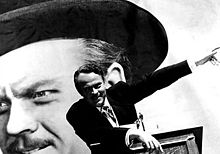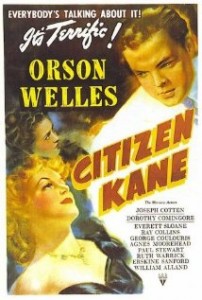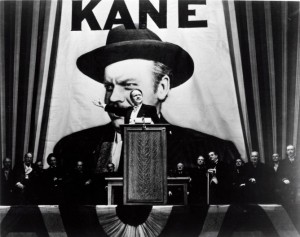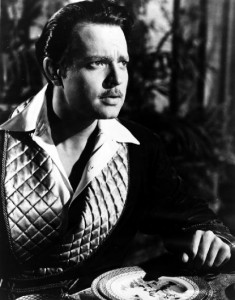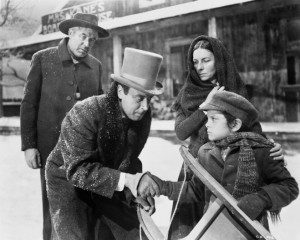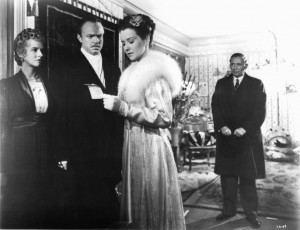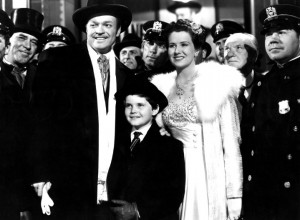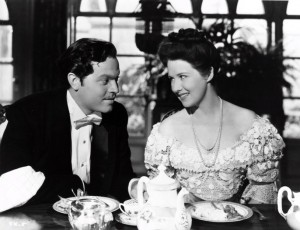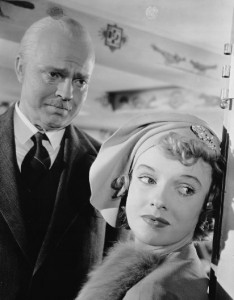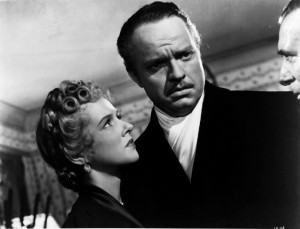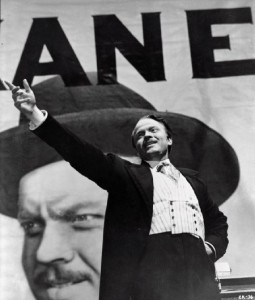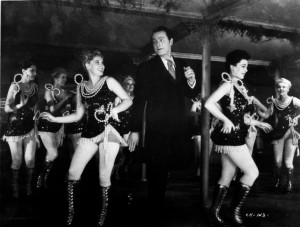Citizen Kane ***** (1941, Orson Welles, Joseph Cotten, Dorothy Comingore, Agnes Moorehead, Everett Sloane, Erskine Sanford) – Classic Movie Review 25
Citizen Kane (1941) is the cinema’s Hamlet. All that has to be done to defend it against attacks from the philistines is to screen it as often as possible to the young, the curious, the intelligent and the faithful. In fact to everybody. Orson Welles’s first film, made when he was only 25, remains unchallengeable as one of the cinema’s greatest movies, appearing regularly somewhere near the top of most lists of best films of all time.
A work of utter brilliance, it also proves a glorious showcase for the young Welles’s astonishing acting fireworks as Charles Foster Kane, a corrupt and vicious newspaper tycoon, a dangerous sado-masochist personality who spreads his childhood damage around to those near to him. In business, he treats his noble reporter friend Jedediah Leland, played by Joseph Cotten, appallingly, while at home he wallows in, and almost seems to relish, a stifling, doomed marriage with an attractive young nonentity, Susan (Dorothy Comingore), a virtual non-person who longs for a singing career but can’t sing. It’s an intellectual version of beauty and the beast.
Welles’s all-conquering performance, as the thrusting media baron eaten away by his personal demons and the very business success he savours, is matched by his extravagantly brilliant display of directing technique, relishing every trick of the trade that was known to man at the time – and inventing quite a few new ones.
Cotten, telling the tale in flashback after the tycoon’s death, gives a stalwart turn of subtle, deftly realised acting, an intense and smouldering tour-de-force that in its own, different way matches that of Welles. Indeed, all the performances are outstanding – Everett Sloane, Ray Collins, Paul Stewart, Ruth Warrick, Erskine Sanford, Agnes Moorehead, William Alland, Fortunio Bonanova and George Coulouris.
The film’s virtues are endless: the original screenplay (which won the film’s only Oscar) has an astonishing depth and power, Gregg Toland’s menacing experimental expressionist photography is a continuous eye-opener while Bernard Herrmann provides a haunting, classic score. Incredibly for a revered artwork, it is darned entertaining too. OK, it doesn’t play like a visual-effects-led blockbuster, but it is only slow and boring to those who refuse to engage heart and brain.
The authorship of the script is much disputed, but Cotten and producer John Houseman certainly had an uncredited hand in it, along with credited Herman J. Mankiewicz and Welles. At any rate, their screenplay Oscar win was much deserved, and so were the eight other nominations (for best film, actor [Welles], art direction, cinematography, director, film editing [Robert Wise, with Mark Robson as co-editor], music, sound).
The Charles Foster Kane character was easily identifiable as a scurrilous portrait of the real-life media tycoon William Randolph Hearst, who was naturally enraged by his encrypted portrayal in the film and swiftly took his malicious revenge by banning any mention or review of it in his newspapers, and mounted a campaign that effectively did severe permanent damage to Welles’s career. Infamous media gossip queen Hedda Hopper derided it as ‘a vicious and irresponsible attack on a great man’.
Future star Alan Ladd has a brief walk-on at the end.
Citizen Kane premiered in New York City on 1 May 1941.
Celebrating Orson Welles (1915-1985). Born 6 May.
© Derek Winnert 2013 Classic Movie Review 25
Check out more reviews on http://derekwinnert.com/

